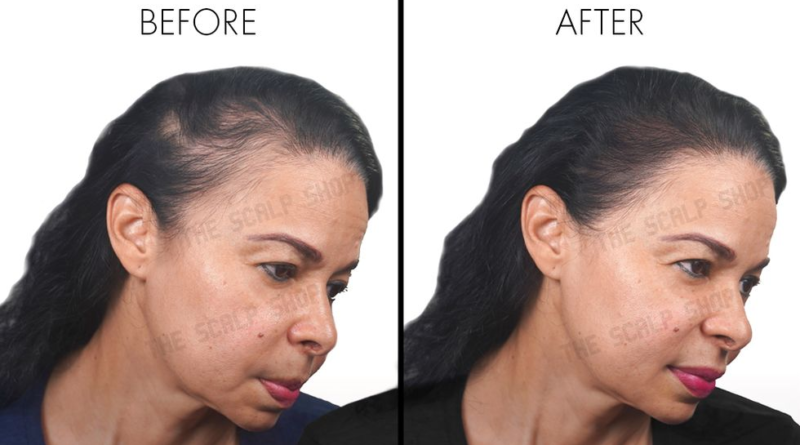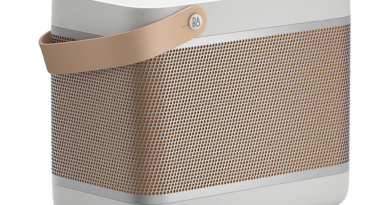Everything You Need to Know About Scalp Micropigmentation
Special shampoos, conditioners and blowouts may “promise” thicker-looking, healthy hair, but for more advanced hair loss issues (think, female pattern baldness autoimmune diseases, hormone imbalances due to postpartum), it doesn’t completely solve the puzzle. Now, more and more women are turning to scalp micropigmentation — a procedure traditional sought by men — to give the illusion of a perfect fade or full, lush tresses. Here’s what you need to consider before you book a consultation according to experts.
What is scalp micro pigmentation?
Scalp micro pigmentation, or SMP, is a non-surgical procedure during which a technician uses a needle and ink to create tiny dots on the scalp that simulate the appearance of hair follicles. FYI: It doesn’t interrupt the hair’s natural hair growth cycle, meaning you can still grow your own hair after you’ve completed SMP. New York City-based SMP artist and The Scalp Shop owner Giovanni James helped developed the technique and products in the late nineties. Today, many offices that do permanent makeup and camouflage tattooing are starting to add SMP to list of services.
Clients need at least two sessions depending on the size of the affected area and their desired coverage. Some may need as many as eight; however, every candidate sees a difference after the very first session. With proper maintenance, SMP results can last for up to eight years.
More From ELLE

Who gets scalp micro pigmentation?
Scalp micro pigmentation has been primarily marketed to men as a way to redefine hairlines affected by male pattern baldness or fill in uneven facial hair. However, more women are seeking this solution as a kind of last resort, after trying less-permanent options like extensions, powders or spray-on hair fibers. “Or, they’re tired of being stuck in what we call ‘wig prison’,” explained Dangerkat, co-owner of The Scalp Shop. She estimates that about 25% of her clients are women, most of whom struggle with hereditary hair loss or are treating damaged hairlines after years of locs, braids or wig glue.
“I would say my first set of clientele for female hair loss are definitely women who have some sort of autoimmune disorder happening within their body, whether it’s PCOS or something to that effect, where they are losing a lot of hair,” explained Jayd Hernandez, owner of Studio Conceal, a camouflaging tattoo studio in Gilbert, Arizona. “And then second to that, I would say would be postpartum.”
Almost anyone concerned about thinning hair is a candidate for SMP, unless they have a skin condition like psoriasis. The Scalp Shop recommends clients only seek SMP if they and their doctors think their condition won’t get any worse.
What is the process?
Hernandez and Dangerkat both stressed the importance of the consultation. In fact, The Scalp Shop uses a cream to simulate the process’ coverage to show clients how their final results will look. They then send them home with photos and videos to reference if they’re still deciding. “We like to have people in our chair that are absolutely comfortable, because it’s a big deal,” said James. “You know, you don’t want people guessing about this.”
The Scalp Shop and Studio Conceal owners say most clients require two to three sessions lasting between three and eight hours to get the desired coverage. Hernandez uses an over-the-counter topical numbing cream but not everyone finds SMP painful. “We literally have had clients that have fallen asleep through the whole session,” she said.
Typically, sessions are spaced ten to 14 days apart. That time allows the ink to settle and for the redness and peeling to stop. Don’t worry—those reactions are an expected part of the process.
After all sessions are completed, a client won’t need to come back for touch-ups for three to six years. “It fades with sun over time,” explained Pasqualotto. Be sure to cover up to get the most longevity out of your treatment, which costs between $2,500 and $4,000. It sounds expensive, but hair transplants start at $4,000 and go up to $10,000; plus, there’s the risk of scarring.
Does scalp micro pigmentation work for all hair types?
SMP is a great option no matter your curl pattern or hair’s natural thickness. The technician will adjust the dots to mimic the appearance of your hair follicles.
Women experiencing thinning can choose to retain their length and simply camouflage the exposed scalp. However, James and Pasqualotto sometimes recommend their clients experiment with shorter styles that suit the current state of their hair and their facial features. Having long hair on the sides and back can often draw more attention to thinning hair at the crown. In the end, the aim is to bring focus to what really matters.
As James explained, “We’re in the business of, more than anything, igniting the energy of the individual so that they become completely empowered with their own look.”








